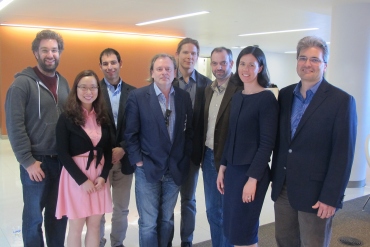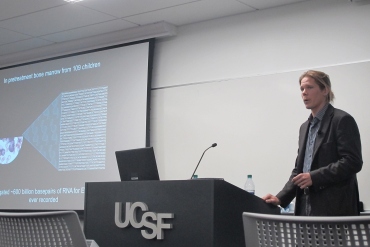
Eleni Linos, MD, MPH, DrPH, and Stephen Francis, MS, PhD, have been awarded the first UCSF Cancer Center Impact Grants, to pursue high-risk, high-reward research projects that would’ve been unlikely to be funded through conventional mechanisms.
The grants – each $250,000 – were announced following a highly competitive selection process and a live “Shark Tank”-style pitch event last week.
Linos, an assistant professor of Dermatology, pitched a project to study if connecting with women through social media can motivate them not to use harmful indoor tanning beds. Francis, a postdoctoral scholar in Epidemiology & Biostatistics, proposed a study looking at whether in utero cytomegalovirus (CMV) infection is a causal factor in the development of childhood acute lymphoblastic leukemia.

Alan Ashworth, PhD, FRS (center), stands with the Cancer Center Impact Grant finalists, from left, James Fraser (who presented with Trevor Bivona), Sophia Pfister, Trevor Bivona, Stephen Francis, Jason Gestwicki, Eleni Linos and Andrei Goga after the live pitch event.
The competition was launched by Alan Ashworth, PhD, FRS, president of the UCSF Helen Diller Family Comprehensive Cancer Center, with a simple question: “Do you have a wild idea that could significantly impact cancer?” Entries were encouraged from anyone in the UCSF community – including students, researchers and staff not affiliated with the Cancer Center.
The Six Impact Grant Finalists
Trever Bivona, MD, PhD
Systematic Transformation of Cancer Mutations into Druggable Therapeutic Targets
Stephen Francis, MS, PhD
In Utero Cytomegalovirus Infection as a Causal Factor in the Development of Childhood Leukemia
Jason Gestwicki, PhD
Mapping Cancer Proteostasis Networks to Discover New Drug Targets
Andrei Goga, MD, PhD
Revealing the Secret Lives of Tumor Cells
Eleni Linos, MD, MPH, DrPH
Melanoma Prevention Using Social Media
Sophia Pfister, PhD
Accurate Early Detection of Harmful Cancers from One Drop of Blood Using Artificial Intelligence
“The Impact Grant aims to fund unique, high-risk projects that would not otherwise get support in the current environment,” said Ashworth. “By easing application criteria, we heard bold ideas from applicants spanning multiple disciplines and career levels at UCSF.”
From an initial pool of 52 applications, six finalists were selected to give five-minute presentations and field questions from a live audience at Mission Hall. The audience included the judging panel of UCSF faculty, though the judges remained anonymous during the event.
The Cancer Center Impact Grant originally was to fund one project with $250,000 over two years, but after the dynamic presentations by all of the finalists on Wednesday afternoon, Linos and Francis were selected to each receive $250,000 grants.
Cancer Prevention through Online Advertising
Linos is concerned about the growing use of indoor tanning among young adults. She believes that the way to shift this behavior is by targeting youth on social media.
Linos is planning to test whether online advertising on social media is an effective way to shift cancer risk behaviors. She believes online advertising works to shift our attitudes to brands or convince us to purchase products, but there is not rigorous data yet available for public health researchers to know if the approach works for cancer prevention. Her study aims to provide such data, and if the principle of using social media to change high-risk cancer behaviors in the population tested works, it could be applied to many other public health goals from tobacco cessation to vaccination.
Linking a Virus to Childhood Leukemia
Francis said he will use the funding to work to validate a connection between acute lymphoblastic leukemia and CMV infection during pregnancy.

Stephen Francis, MS, PhD, presents during the Cancer Center Impact Grant live pitch event.
His group already has sequenced pre-treatment bone marrow for 109 children with acute lymphoblastic leukemia and interrogated over 6 billion base pairs of RNA for every virus ever recorded. The group found one distinguishing virus: cytomegalovirus. When the virus is transmitted from mother to child in utero, it is known to cause serious birth defects and chromosomal aberrations.
Using the grant money, Francis plans to run a study that will screen 1,000 cases and 1,000 controls for in utero CMV infection. His group will then use 15 cases of acute lymphoblastic leukemia that are true positives at birth and 15 that are true negatives at birth. He will do a full genome sequence of their tumors and find the mutational patterns, looking for mutational signatures that would be present in the children infected with CMV in utero and absent from the children who are not.
Though the two winners of the UCSF Cancer Center Impact Grants focused on melanoma and acute lymphoblastic leukemia, the 52 original applications contained many interesting ideas that ran the gamut of cancer research. Ashworth said many of the proposals are worthy of funding.
“I now have a folder with 52 interesting applications,” he said. “I will go out of my way to use that information to raise more money for those proposals, and we will try to work out how to fund the ones that are the most impactful. This is the start of a process, not the end of a process.”